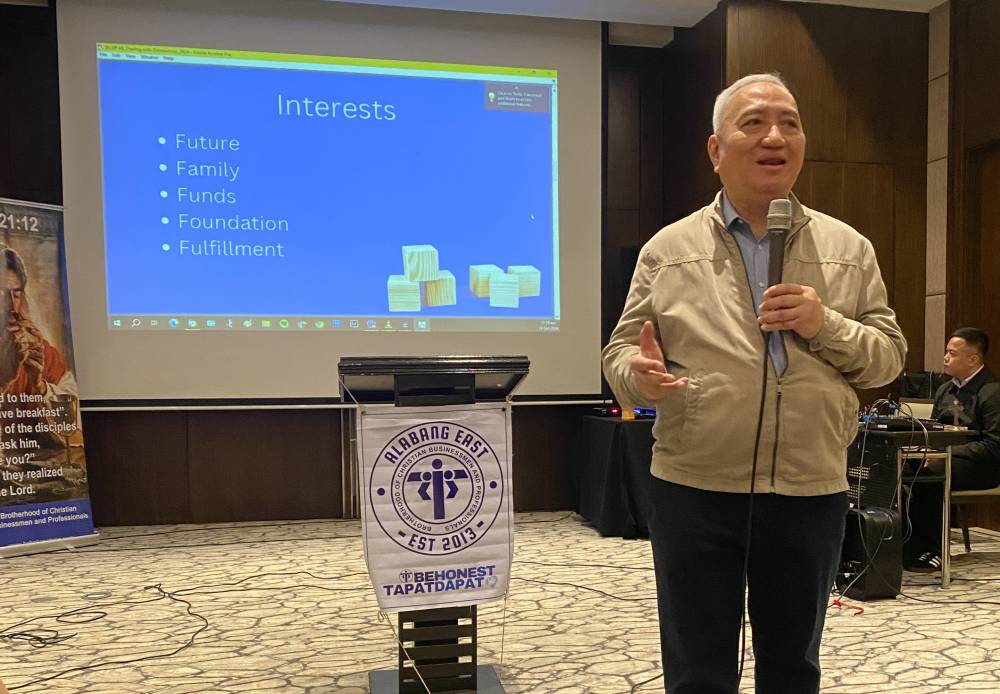Resolving conflict by choosing harmony over hurt

Maintaining peace within any relationship can be difficult. The challenge can feel even more intense in Christian communities, as faith asks us to go beyond just getting along: It calls us to unity.
This topic was addressed by international executive coach Archie Inlong in a recent teaching assembly held by the Brotherhood for Christian Businessmen and Professionals (BCBP) Alabang East at Somerset Hotel.
Inlong, known for his deep engagement with audiences, speaking without notes and showing willingness to be vulnerable, explored the roots of discord and offered practical steps to restore unity.
He asked the group: “Why are unity and harmony important to us as Christians?” The reasons are spiritual and practical. He pointed out that Jesus himself prayed for our unity in John 17:21: “That they may all be one, so that the world may believe that You have sent Me.”
Unity among believers is not just about internal peace; it’s a powerful witness to the world of God’s love and presence.
Commandment
Inlong stressed that Christian unity is not optional, but a commandment. Citing 1 Corinthians 1:10, he emphasized how Paul appealed to the early church to “live in harmony with each other so that there be no division.” Disharmony, he noted, isn’t just a relational issue, but a disobedience to God’s call for His people to be one in heart and mind.
When Christians overcome their differences and live in harmony, it brings glory to God. Romans 15:5-6 reminds us that “living in harmony despite differences proves to the world that Jesus has been sent.”
Why don’t we always get along? Inlong humorously illustrated that even the smallest things could cause friction, like where you press the toothpaste tube or who parks where. He called these everyday disagreements PIPEs: preferences, interests, personal space and ego triggers that can lead to conflict.
Preferences are how we like things done, which can clash with others’ ways.
Interests are five Fs: our future, family, funds, foundation (values) and fulfillment (especially personal to Gen Z). These interests are things that matter and are of value to you. Since these are important, conflict arises when someone threatens or disregards them. We fight when any of our interests are in danger. This is the reason for conflict, when someone puts your interest at risk, but if someone works in your best interest, you get along.
Boundaries
Personal space can be visual (I don’t want to see you), auditory (I don’t like to hear your voice or music), physical (taking one’s parking spot, blocking the driveway, an unwanted invasion in a family) or emotional (space where you allow people into your life). We all have boundaries, and when these are violated, it can cause tension.
Inlong reminded the group that when you commit to enter a community or family, you agree to allow members in. Previously disqualified people now have the privilege to enter personal spaces, which can trigger anger if unwelcome.
Ego is often the root of many arguments. A bruised ego leads to defensiveness and anger.
However, in a Christian community, we must make these PIPEs secondary to a larger goal: the kingdom of God. This means surrendering our egos and letting God reign over us, even when uncomfortable.
Conflict is inevitable in relationships, but the Bible provides a roadmap for resolving it in a healthy and God-honoring way. In Matthew 18:15-17, Jesus teaches us to address issues privately first, then bring in witnesses if necessary, and finally seek guidance from the church if the problem persists. Inlong expanded on this with what he called the “4 Rs” of reconciliation:
‘4 Rs’
1. Reconnect: Don’t allow conflicts to fester. The longer you isolate, the more room there is for division. Mutual effort to reconnect quickly is critical.
2. Recognize: Acknowledge what went wrong. Avoid blaming or debating; both parties are likely at fault in some way.
3. Release: True forgiveness requires an admission of wrongdoing. “I’m sorry if I hurt you” doesn’t cut it. When asking for forgiveness, take responsibility for your actions.
4. Rebuild: Strengthen the relationship by restoring it to an even higher level of trust and connection.
Inlong emphasized that forgiveness should be complete and unconditional. While it’s natural to remember the hurt, the key to restoring harmony is to let go of the offense and not use it against the other person in the future. Forgiveness is about release; it means we don’t keep bringing up the past.
While forgiveness is central to Christian teachings, it’s not easy. In secular relationships, forgiveness might stop at release, especially if the other party has no desire or ability to rebuild.
Consider the example we set for our children in moments of conflict. What message are we giving them if we forgive without repairing what was broken? Even in painful situations, like the murder of a loved one or the infidelity of a spouse, it’s important to focus on healing rather than revenge.
This doesn’t mean that hurtful thoughts don’t linger; Inlong candidly admitted that he still has fantasies of getting back at those who took his father’s life. But the key is to return to God continually, and to His call for unity and forgiveness.
Living in harmony is difficult because it often requires us to sacrifice our egos and personal preferences. But for Christians, the compelling reason to do so is found in obedience to God, who commands us to be one. This unity glorifies Him and serves as a powerful testimony to the world.
Inlong’s message is clear: Disharmony in our Christian relationships is a relational and spiritual problem. It’s a call to look beyond ourselves, focus on God’s kingdom, and allow His love and grace to flow through us, even when we disagree.

















